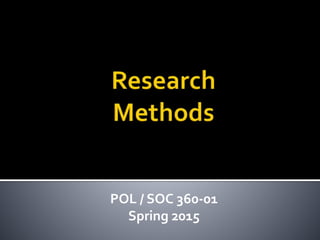
POL SOC 360 Science Society Social Research
- 1. POL / SOC 360-01 Spring 2015
- 8. Referring to individuals who are socially or politically defined as producers of knowledge Examples: Oracles Religious Figures Kings How do you discredit an authority?
- 9. Chairman Mao Zedong’s “Little Red Book” served as a guidebook for proper behavior and thought.
- 11. Obtained from supposed supernatural beings (e.g. prophets, mediums, etc.) Existence of supernatural events and psychological state of consumer Nostradamus Joseph Smith
- 13. Strict adherence to logic Main Assumptions: (1) Human mind understands world independent of observable phenomena (2) Forms of knowledge exist independently of personal experiences Scientific knowledge is threat
- 15. INSTRUCTIONS: Write down terms, concepts, ideas, etc. that come to mind when you hear this word. SCIENCE
- 16. Is science a prestigious undertaking? Is science the compilation of a body of knowledge? Is science the objective research of empirical phenomena?
- 17. A set of logical, systematic, documented methods for investigating nature and natural processes, and the knowledge produced by these investigations.
- 18. Astrology is considered a pseudoscience. Pseudoscience occurs when claims are presented appearing scientific, even though they lack supporting evidence.
- 20. #1: Nature is Orderly Regularity and Order Structure amidst Change Example: Newtonian Laws of Motion #2: We Can Know Nature Humans are a part of nature Human behavior can be explained Humans exhibit patterns conducive to investigation
- 21. #3: Natural Phenomena Have Natural Causes #4: Nothing is Self-Evident #5: Knowledge Based on Experience Empirical investigation evidence for relationships Importance of Perception #6: Knowledge is Superior to Ignorance Knowledge for knowledge’s sake Findings open to continual review
- 24. Explanations for “Why?” questions DEDUCTIVE REASONING Specific expectations are deduced from a general premise. INDUCTIVE REASONING General conclusions are drawn from specific data. X causingY Sample Population Cannot be 10o% certain. (95% is good enough) Socrates Transitive Property
- 26. “Gold standard” of science You have made predictions today. X causesY X is present Can predictY
- 28. VERSTEHENTRADITION Natural and social sciences are separate bodies of knowledge Objective and subjective nature of behavior Definition of Social Science Importance ofWeber LOGICAL EMPIRICISM “Unified Science” approach Social and natural sciences studied and investigated with same approaches
- 30. ARISTOTLE FRANCIS BACON CARL HEMPEL
- 31. Popper believed that theories are tentative “conjectures,” rather than universal laws assumed to be true
- 32. “Normal Science” “Revolutionary Science” How does a “revolution” occur in science? What was Popper’s argument against Kuhn?
- 34. What is “methodology?” Methodological Change in Political Science Traditional / Historical Approach (1930-1960) “Behavioral Revolution” / Empirical Approach (1960s) Perestroika Movement (2000s) Why methodology?
- 36. Observing Errors: Selective Observation; InaccurateObservation Generalizing Error: Overgeneralization Reasoning Error: Illogical Reasoning Reevaluating Error: Resistance to Change Why might this occur?
- 39. Policy Motivations Academic Motivations Personal Motivations
- 41. Descriptive Research Defines and describes social phenomena Exploratory Research Investigation of phenomena without expectations Explanatory Research Identifies causes and effects of social phenomena Evaluation Research Determines effects of social programs, etc.
- 43. Quantitative Analysis Large “N” Mathematics and Statistical Methods General Patterns of Human Behavior Qualitative Analysis Small “N” Few Cases / Observations Field Studies, Interviewing, Direct Observation
- 47. STRENGTHS Overcomes errors in reasoning Clarity of opinion Accumulation of knowledge Expansion of knowledge LIMITATIONS Different interpretations Different results Complexity of social world